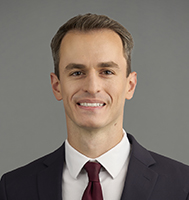Q&A with Dean Karahalios, DO, assistant professor, Division of Cardiology
 Hometown: Chicago, Illinois
Hometown: Chicago, Illinois
Educational/professional background: I completed my undergraduate degree at Loyola University Chicago and my medical degree at Midwestern University Chicago College of Osteopathic Medicine. My pediatric residency was at SUNY Upstate Medical University in Syracuse, and I did a pediatric cardiology fellowship at Children’s Hospital of Michigan in Detroit. I also completed a fellowship in pediatric heart failure and transplant at Ann and Robert H. Lurie Children’s Hospital of Chicago.
Previous position (title, institution): Pediatric heart failure and transplant fellow, McGaw Medical Center of Northwestern University at Ann and Robert H. Lurie Children’s Hospital of Chicago
What is your field of research or area of clinical care, and how did you get into it? I specialize in the care of pediatric patients with heart failure who need advanced therapies such as mechanical circulatory support and/or transplant. I was guided to the field by the principle of cura personalis (care of the whole person). I enjoy the opportunity to work as part of a multidisciplinary team that may include physicians, surgeons, nurses, pharmacists, nutritionists, psychologists, social workers, rehabilitation therapists, coordinators, and, of course, patients and families. I always admired the depth of care that my mentors in the field practiced and the long-term relationships that resulted. Pediatric heart transplants are relatively rare, so I am also inspired by the opportunities for collaborative research through networks such as the Advanced Cardiac Therapies Improving Outcomes Network (ACTION) and the Pediatric Heart Transplant Society (PHTS). Hence, some of my most recent research projects have utilized these databases to gather greater insights into patients who are listed at lower acuity or who have been inactivated on the transplant waiting list. Relevant to my interest in whole-person care, I was also recently involved in a mixed-methods, interview-based study about the lived experience of teenagers who have been discharged home with mechanical support.
How would you describe your work to a 5-year-old? I take care of babies, kids, and teenagers with hearts that don’t work well. Sometimes they need medicine, sometimes they need a pump, and sometimes they need a whole new heart. I work together with lots of other people to make sure everyone’s heart is healthy so that they can do the things that they want to do!
What attracted you to UW–Madison? The Pediatric Advanced Cardiac Therapies program at UW–Madison is in an exciting stage of growth. The opportunity to take part in that growth with a fantastic team and abundant academic resources, all while being geographically close to home, makes UW–Madison an attractive place to be for me.
What is your favorite thing to do in Madison? I am still learning all that there is to do here, but so far, I have really enjoyed the hiking and biking trails nearby. My family and I have also enjoyed exploring the farmer’s market and downtown Madison.
What’s one thing you hope trainees will learn from you and your work? I hope trainees see that the pediatric heart failure and transplant population is a special population with opportunities to build deep, longitudinal relationships with patients and families. I hope they also see the power of collaboration, both in the clinical setting and academic setting. This collaboration built into the structure of the field makes pediatric heart failure and transplant care truly extraordinary and keeps it running at the forefront of medicine and biomedical technology.
Do you feel your work relates to the Wisconsin Idea? If so, please describe how. My work relates to the Wisconsin Idea of impactful education beyond the classroom because caring for heart failure and transplant patients involves educating not only the patients themselves, but also their families and the communities in which they live. For example, most people have never seen a ventricular assist device, a pump that helps the heart function. We often partner with local schools or fire departments to educate school nurses and first responders on how to respond to the basic needs of our heart failure and transplant patients before they arrive at our hospital or clinics. These partnerships are just one way we ensure our patients will thrive before they ever leave our campus.
What’s something interesting about your area of expertise you can share that will make us sound smarter during video chats and parties? One of the early iterations of ventricular assist devices was a loud, clunky machine that weighed about 200 pounds. Today, there are ventricular assist devices that are so small that they can be placed without open-heart surgery.
What are some of your hobbies and other interests? I enjoy staying active, especially in the outdoors. Some of my favorite activities are hiking, running, biking, and swimming. In fact, I completed my first triathlon this summer and hope to do another one. My wife and I have also been enjoying exploring the world through our twin daughters’ eyes.